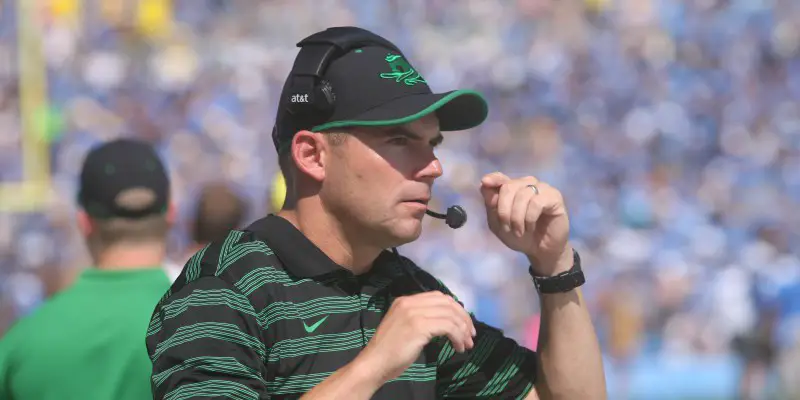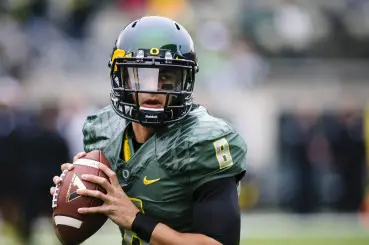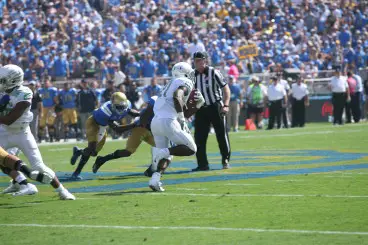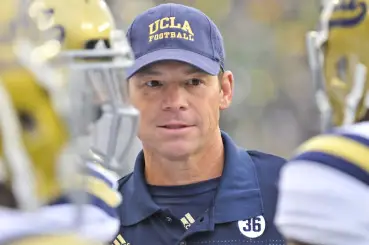Mike Merrell’s Three and Out
It stands to reason that the top football recruits will inevitably make for the best teams. Three of the four teams playing in the 2014-15 National Championship Playoffs — Alabama, Ohio State and Florida State — habitually have top-five recruiting classes. But the fourth — yes, our Oregon Ducks — don’t even come close. In fact, if you take Alabama, Ohio State, Florida State and throw in USC and UCLA, the last time Oregon out-recruited a single one of them was 2011.
Yet when you take a look at which team has won the most games in the past five years, it is the seemingly recruiting-impaired Ducks that come out on top with a total of 60 wins against only 8 losses. Alabama is second-best at 58-9. Ohio State is 56-11. USC and UCLA are a ho-hum 44-21 and 39-27, respectively.
There are those who lament that Oregon doesn’t do better on the recruiting trail with such a record of success, but why the Ducks don’t even want top recruiting classes is the subject of this week’s Three-and-Out — and here are the reasons.
1. The Ducks don’t NEED top recruiting classes.
A recruiting class is scored upon the perceived quality of all of its recruits added together. So, larger classes naturally have an advantage over smaller classes. The kicker here, though, is that a larger class means that a team had more openings to fill — and is this a good thing?
Had Marcus Mariota, Hroniss Grasu and Ifo Ekpre-Olomu opted for the NFL draft a year ago — as they could have — Oregon would have had three more openings, which when filled would have upped the value of the 2014 recruiting class. So — which three of all the freshmen in the country would have added more value to the team than those three returning Ducks?
Each school is allowed to extend scholarships to 25 incoming football athletes each year, and by stretching the rules through early enrollments, many schools push the number up to 30 and beyond. They can only do this because they have holes to fill.
Oregon’s 2015 recruiting class of 22 athletes is about par for the Ducks, because they simply do too good of a job of retention to have room for 25 to 30 incoming each year — and this is not a bad thing.
2. Top high school athletes are not necessarily desirable.
Some of the top high school athletes are great individuals who have great work ethic, do well in school, and are the sort who will always put the team first. Others — not so much. In fact, a top athlete has a much greater opportunity to destroy a locker room than one who doesn’t have quite the natural ability on the gridiron. Athletes expect to look up to those with superior skills, but when the personal traits don’t measure up, team leadership suffers, and as a result the team will under-perform.
Being a national center of attention at a young age does not wear well on many. Child movie stars — who tend to end up messy — are a prime example. The worshiped high school athlete carries a high risk of “full of himself,” a quality that doesn’t fly with the Ducks and has resulted in the early departure of more than one top recruit. And the “Which hat will I put on in front of an audience?” thing is a bit of warning sign of “It’s all about me.”
Beyond that, too much success at a young age can lead to a loss of hunger, which can manifest itself in not wanting to work as hard as the Ducks’ coaches promise. It can also result in a desire to be in a city with more diversions than Eugene has to offer.
In commenting on Charles Fischer’s Friday recruiting article, Michael Rand (meaning this as a put-down on the Ducks, I surmise) wrote:
“Let’s see. I’m 18 and I have to chose between Eugene, San Francisco or LA. Does anyone really think Eugene has a chance?”
Well Michael, that depends. For the athlete seeking diversion, Frisco and LA have more to offer. But if you’re focused on wanting to do your best and play for a perennial top five team, the answer lies somewhere north of California.
Fortunately for Oregon, it is focus — not diversion — that creates success in just about anything. In fact, Michael, you may have just hit the target on why USC and UCLA recruiting classes habitually under-perform. They make their choices for the wrong reasons.
There’s also something to be said for the athlete for who is emotionally prepared to step out in the world, spend four years in a new environment and let some distance creep in between himself and the adulation of family and friends. It’s called maturity, and it makes for a more balanced athlete than the guy who isn’t ready to stray from mama’s apron strings.
This is not to say that Oregon doesn’t want the five-star recruits — but they need to be the right five start recruits and it needs to be on Oregon’s terms.
3. The best salesmen don’t necessarily make the best coaches or have the highest ethics.
In fact, high ethical values frequently result in lost sales on and off the field. What people want to hear is so often more appealing than the truth. But it sometimes leaves them disappointed when the truth comes out. And this is nowhere that we would ever want to see Oregon coaches go.
But telling recruits what they want to hear doesn’t just net that deceived, soon-to-be-disappointed recruit. It also has the questionable advantage of creating more openings on future years’ recruiting classes when the recruits leave early after learning the truth.
But speaking of truth, it is a universal truth that we all have qualities that are stronger than our other qualities — and salesmanship and coaching ability are traits that have a strong chance of going in different directions. The salesmen have great success selling the ideas of movie stars, palm trees, sunny weather and family and friends in the back yard, especially when they don’t mind bending facts. So, more often than not, they win the recruiting battles.
But when it comes to the war — the numbers on the scoreboard at the end of a game — it is the coaches who win. And it is Oregon, led by Mark Helfrich, that has the coaches.
Top photo by David Pyles
Related Articles:
Chip Kelly Update: Everything's Good Again ...
Chip Kelly Update: Wailing and Gnashing of Teeth
Shock and Awe -- The Oregon Ducks' Football Hangover Effect
Despite Lopsided Score, Georgia State "Never Stopped Believing"
Hope Springs Eternal for Ducks
Incompetent Pac-12 Officials: How Do You Miss ALL of THIS?
Mike (Editor-in-Chief) is a 1970 graduate of the University of Oregon where he attended the Honors College and received all-conference honors as a swimmer. After college, Mike ran for the Oregon Track Club and narrowly missed qualifying for the US Olympic Trials in the marathon. He continues his involvement in sports with near-daily swimming or running workouts, occasional masters swim competition (where he has received two Top-10 World rankings), providing volunteer coaching to local triathletes and helping out with FishDuck.com.
Mike lives on 28 acres in the forest near Sandpoint, Idaho, where he has served as a certified public accountant for most of his working career. His current night job is writing novels about Abby Westminster, the only known illegitimate daughter of Britain’s finest secret agent who has to bring down arch-villains plotting dastardly deeds. And, yes, Abby is also a DUCK!





